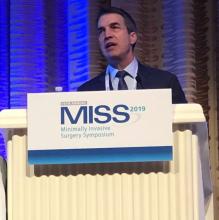LAS VEGAS – Hernia surgeons are square in the path of a growing backlash against the use of mesh in surgery, a fellow surgeon says, and he’s warning colleagues to take heed of the trend.
“I tell you, it’s coming,” B. Todd Heniford, MD,, professor and chief of gastrointestinal and minimally invasive surgery at Carolinas Medical Center, Charlotte, N.C., declared in a presentation at the Annual Minimally Invasive Surgery Symposium by Global Academy for Medical Education.
“This is no time to abandon surgical mesh in hernia procedures,” he argued. Instead, he said surgeons should engage in better communication with patients. Otherwise, “we are not helping ourselves as surgeons.”
In the United States, most of the controversy around the use of mesh in surgery has revolved around transvaginal procedures in women. As a 2017 historical review explained, “mesh used to augment transvaginal repair of [pelvic organ prolapse] was introduced in the United States in 2005 without clinical safety and efficacy data. In the subsequent years of use, both major and minor complications were increasingly reported, leading to several [Food and Drug Administration] notifications and warnings” (Int Urogynecol J. 2017 Apr;28[4]:527-35).
An FDA safety alert in 2011 and new requirements for postmarked surveillance orders convinced most manufacturers to stop marketing surgical mesh for transvaginal repair of pelvic organ prolapse. According to a 2018 report, an estimated 73,000 patients in the United States have filed product liability claims regarding complications from mesh used in transvaginal procedures (Female Pelvic Med Reconstr Surg. 2018 Jan/Feb;24[1]:21-25).
Outside the United States, Dr. Heniford said, concerns about surgical mesh have spawned a global outcry about its use in another kind of procedure – hernia surgery. “It is gaining speed in Europe, Australia and New Zealand,” he said.
Indeed, these are some recent headlines in Australian and British news outlets: “Concern grows over hernia mesh as more patients share post-surgery horror stories,” “Hernia mesh concerns grow among men as more patients report surgery complications,” “Pelvic and hernia mesh patients will confront politicians and bureaucrats in April over the medical device industry,” and “Mesh implants: Man speaks of procedure’s devastating impact.”
“When people read this, it influences them,” Dr. Heniford said. “And mesh companies are not helping us, let’s be frank about it,” he added, noting that manufacturers have launched recalls due to problems and complications.
Is the anti-mesh frenzy regarding hernias coming to the United States? “Absolutely,” said Dr. Heniford, noting that an online search will turn up many legal websites devoted to hernia mesh lawsuits. And, he said, hernia patients are already concerned because of commercials they’ve seen on TV. “One of the issues is that the lawyers in the United States have become real experts on mesh for pelvic slings,” he said. “They’ve just about run through that.” It’s not just lawyers who are taking advantage of the anti-mesh trend. “If you go online and you type in ‘no-mesh surgery,’ ” he said, “you’ll see loads of surgeons who are trying to take advantage of this.”
In reality, research supports the use of mesh in hernia procedures. A 2018 Cochrane Library review found that “overall, hernia repairs with and without mesh both proved effective in the treatment of hernias, although mesh repairs demonstrated fewer hernia recurrences, a shorter operation time and faster return to normal activities. Non-mesh repairs are still widely used, often due to the cost and poor availability of the mesh product itself” (Cochrane Database Syst Rev. 2018, Issue 9.)
Dr. Heniford suggested that surgeons can do much more to calm patients about the use of mesh. One strategy, he said, is to help them understand that they may face pain after their procedures that has nothing to do with surgical mesh.
“We do not counsel our patients enough about postoperative pain,” he said. “If you see someone who had real pain prior to the operation, you really have to counsel them about postoperation pain. Patients who present with pain are much more likely to have pain after surgery.”
He noted that surgical mesh isn’t appropriate for all patients.
Dr. Heniford left colleagues with this message: “If we use mesh, there’s no question we improve our outcomes long term. But we’ve got to be careful about how we place it and the patients we choose.”
Global Academy for Medical Education and this news organization are owned by the same parent company. Dr. Heniford disclosed relationships with Allergan, Stryker, and W.L. Gore.

